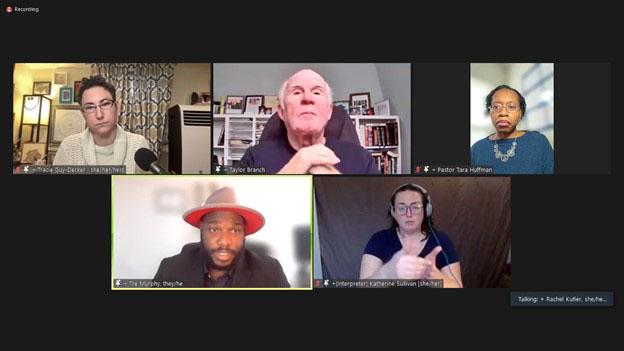
which was hosted by more than a dozen organizations (Screenshot by Susan C. Ingram)
Jews United for Justice, Baltimore Hebrew Congregation and more than a dozen organizations commemorated the birthday and work of Martin Luther King Jr. with an interactive online event Sunday, “Honoring Dr. King: The Enduring Relevance of ‘Letter from a Birmingham Jail.’” More than 200 people attended.
With dramatic readings of King’s letter to his “Fellow Clergymen” by Baltimore School for the Arts students, small-group conversations and discussions with panelists, the event offered a look back and a look forward at the nation’s civil rights and social justice movements. Panelists were Tre’ Murphy, community organizer; the Rev. Tara Huffman, grant maker and pastor; and author and King scholar Taylor Branch. Rabbi Andrew Busch, of Baltimore Hebrew Congregation, opened the event.
Moderated by Laura Menyuk, Tracie Guy-Decker and Molly Amster (with sign-language interpreters), discussions focused on grounding King’s message and hopes for the movement, including its religious and organizing implications.
Busch addressed the intersection of the Jewish community with the civil rights movement.
“I think those Jewish groups gathered today to celebrate and respect the legacy of the Rev. Dr. Martin Luther King Jr. do so because we mean to amplify the work of those directly impacted and personally struggling with the baggage bestowed upon this great country,” Bush said. “Some of you are on all sides of that issue … hopefully feeling supported by your Jewish community and communities.”
King’s “Letter from a Birmingham Jail” was a response to eight, white, so-called “moderate” Southern clergy who printed a statement in a Birmingham newspaper denouncing King’s timing and tactics. King’s organized boycotts, marches and other actions demanded racial justice and equality, especially voting rights for Black people, who had long been denied that particular power. He was jailed for leading a protest march boycotting local discriminatory businesses.
“I am in Birmingham because injustice is here,” King wrote in the margins of a newspaper smuggled into his jail cell. “You deplore the demonstrations taking place in Birmingham. But your statement, I am sorry to say, fails to express a similar concern for the conditions that brought about the demonstrations. I am sure that none of you would want to rest content with the superficial kind of social analysis that deals merely with effects and does not grapple with underlying causes. It is unfortunate that demonstrations are taking place in Birmingham, but it is even more unfortunate that the city’s white power structure left the Negro community with no alternative.”
King rebuked the “moderate” clergy who he said were more “devoted to ‘order’ than to justice” in asking Black people to “wait for a ‘more convenient season.’”
“Shallow understanding from people of good will is more frustrating than absolute misunderstanding from people of ill will,” he wrote.
For Murphy, co-founder and director at Organizing Black, King’s position still resonates today.
“If we allow people, particularly people in positions of power or influence, as was the case for the recipients of this letter, to believe or think that they can simply agree with the central message of injustice, but not talk about the labor, that there’s tough work that has to go into rectifying that, or they can agree that there’s an issue, but disagree with the tactics, then they have put no skin in the game,” Murphy said.
Branch noted that King’s long, pointed and poignant letter received little attention at the time, picked up by only a handful of publications. It has, however, since become a historic and persistently timely document in the social justice movement — and a call to action.
“When he came out of jail having written this letter, and nobody paid any attention to it, the movement in Birmingham continued to decline to the point of extinction,” Branch said. “And the only thing that saved it was that some of the people on his staff said that … we’ve got hundreds of young people who are willing to take up the marches where the adults have trickled down to almost nothing.”
Ultimately, it was “The Children’s Crusade” that helped bring national and worldwide attention to the brutality and inequities of segregation and began turning the tide of public opinion.
At Sunday’s event, Guy-Decker asked panelists to address — although much of the social injustice delineated in King’s letter still exists today — what has changed in the ensuing 58 years.
“What has moved in a positive direction that we should be doing more of?” Guy-Decker asked.
Huffman, of Zion Deliverance Center, said, “It is because of organizing that we have not only seen the transformations that we’ve seen since 1963, but we’ve seen them at an accelerated pace.
“Because communities, particularly of color or communities that are being oppressed in some form or fashion, have learned how to organize. They have taken the lessons of the civil rights movement, they have improved upon them, they have understood that there is a science to organizing. We will not continue to make progress unless we continue to embrace organizing.”
Murphy said the movement has gone from “protest to power,” with laws shifting toward racial and social justice, cultural norms shifting and with more collective leadership.
“That’s what it means to have power,” he said. “To be able to set an agenda and have that agenda come true.”







